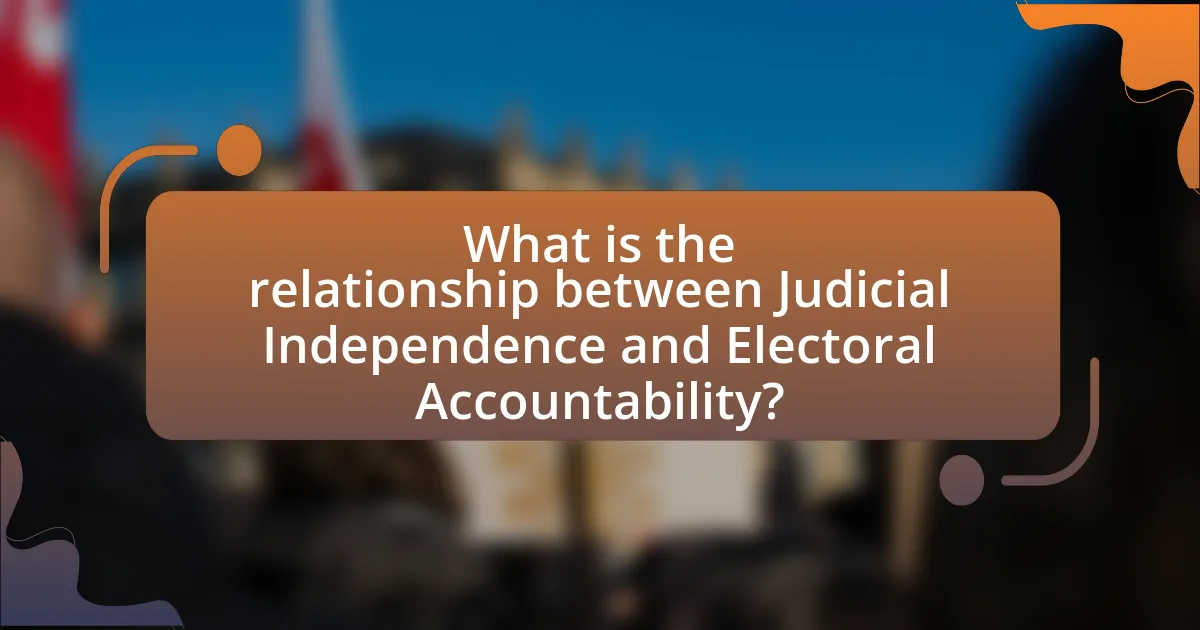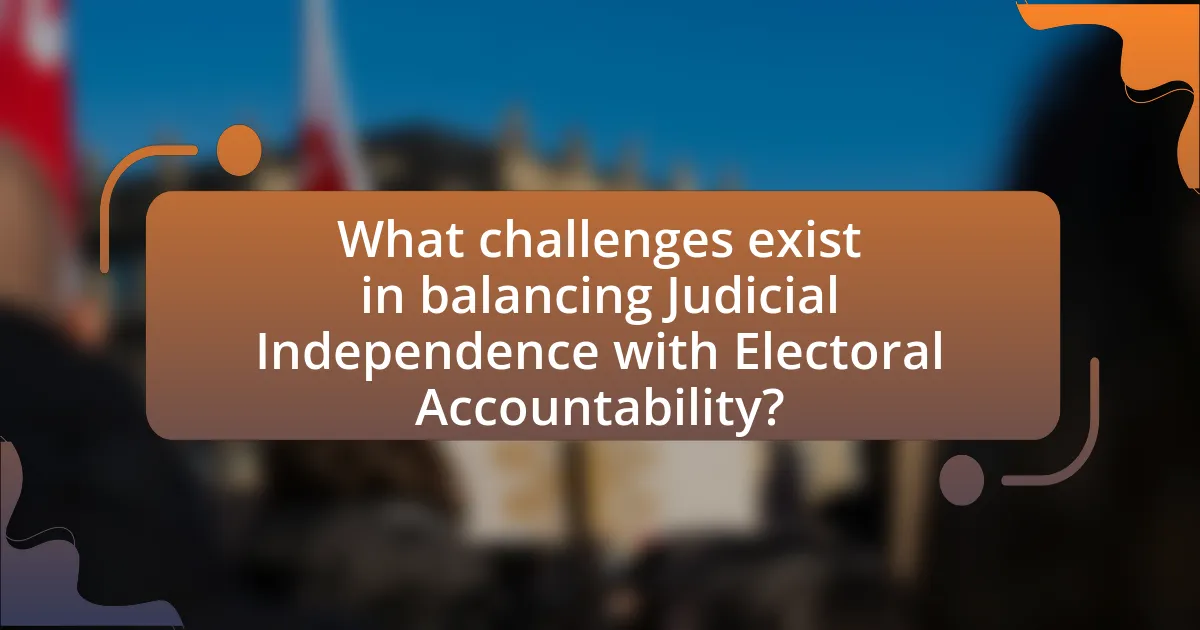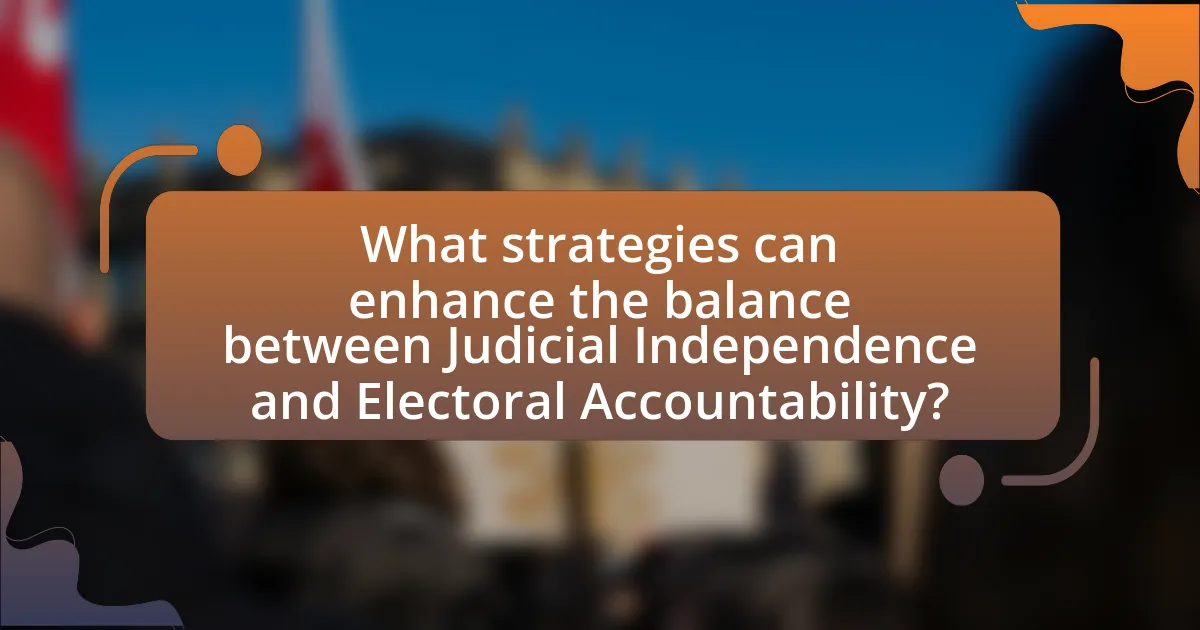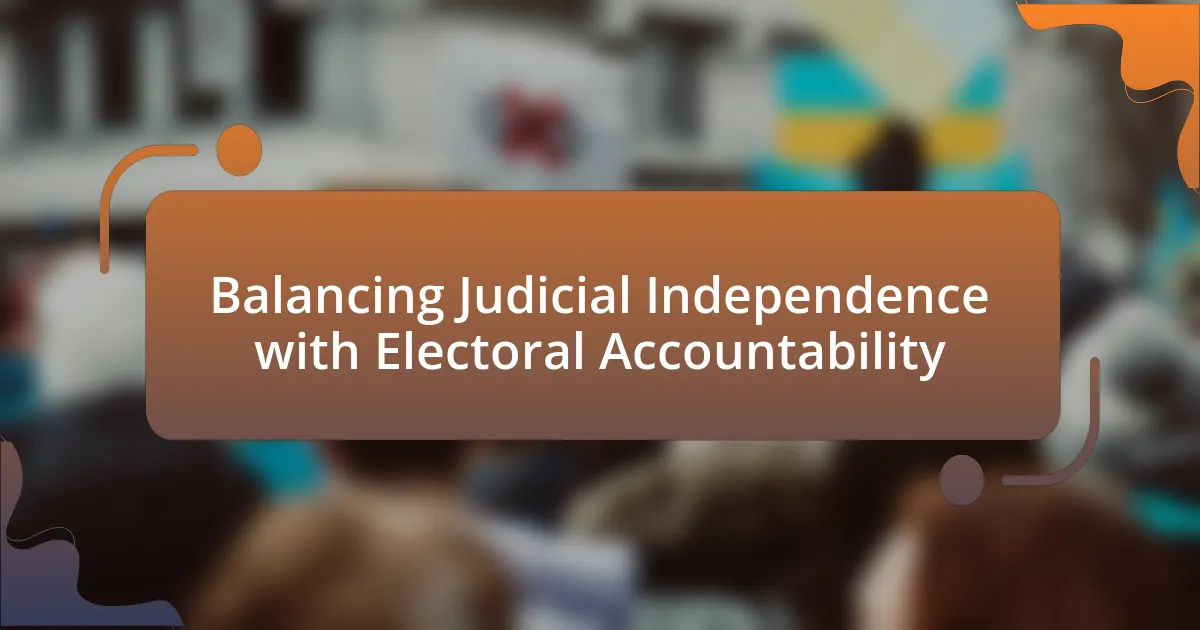The article examines the critical relationship between judicial independence and electoral accountability, two fundamental components of democratic governance. It highlights how judicial independence allows courts to make impartial decisions free from political influence, thereby upholding the rule of law and protecting individual rights. Conversely, electoral accountability ensures that elected officials are held responsible for their actions by the electorate, fostering transparency and responsiveness in governance. The article discusses the principles of judicial independence, the mechanisms of electoral accountability, and the potential conflicts and challenges that arise when balancing these two concepts. It also explores strategies for enhancing this balance, including reforms in judicial appointments, transparency in electoral processes, and the role of civic engagement in promoting accountability.

What is the relationship between Judicial Independence and Electoral Accountability?
Judicial independence and electoral accountability are interrelated concepts that influence the functioning of democratic governance. Judicial independence ensures that courts can make impartial decisions free from political pressure, which is essential for upholding the rule of law and protecting individual rights. Conversely, electoral accountability refers to the mechanisms through which elected officials are held responsible for their actions by the electorate.
The relationship between these two concepts is critical; a strong judiciary can act as a check on the powers of elected officials, thereby enhancing electoral accountability by ensuring that laws are applied fairly and that government actions are subject to judicial review. For instance, in countries with robust judicial systems, courts can invalidate laws or actions that violate constitutional principles, thereby reinforcing the accountability of elected representatives to their constituents.
Research indicates that when judicial independence is compromised, it can lead to a decline in electoral accountability, as elected officials may act without fear of legal repercussions. This dynamic is evident in various political contexts where weakened judicial systems have resulted in increased corruption and abuse of power by those in office. Thus, maintaining judicial independence is vital for fostering a political environment where electoral accountability can thrive.
Why is Judicial Independence important in a democratic society?
Judicial independence is crucial in a democratic society because it ensures that judges can make impartial decisions free from external pressures, including political influence. This independence protects the rule of law and upholds individual rights, as it allows the judiciary to act as a check on the powers of the executive and legislative branches. Historical examples, such as the U.S. Supreme Court’s decision in Brown v. Board of Education (1954), illustrate how an independent judiciary can challenge unjust laws and promote social justice, reinforcing the principle that all individuals are equal under the law.
What are the key principles of Judicial Independence?
The key principles of Judicial Independence include the separation of powers, impartiality, security of tenure, and financial independence. The separation of powers ensures that the judiciary operates independently from the executive and legislative branches, preventing any undue influence. Impartiality requires judges to make decisions based solely on the law and facts, free from external pressures or biases. Security of tenure protects judges from arbitrary removal, allowing them to make decisions without fear of repercussions. Financial independence ensures that the judiciary has adequate resources to function effectively without reliance on other branches of government. These principles are essential for maintaining public confidence in the judicial system and upholding the rule of law.
How does Judicial Independence protect the rule of law?
Judicial independence protects the rule of law by ensuring that judges can make decisions free from external pressures or influences, thereby upholding legal principles consistently and fairly. This autonomy allows the judiciary to interpret and apply laws impartially, which is essential for maintaining public trust in the legal system. Historical examples, such as the establishment of independent courts in democratic nations, demonstrate that when judges are insulated from political interference, they are more likely to safeguard individual rights and uphold constitutional norms, reinforcing the rule of law.
What role does Electoral Accountability play in governance?
Electoral accountability is crucial in governance as it ensures that elected officials are held responsible for their actions and decisions by the electorate. This mechanism fosters transparency and responsiveness, compelling politicians to align their policies with the preferences and needs of the citizens. For instance, studies have shown that countries with strong electoral accountability mechanisms tend to exhibit lower levels of corruption and higher public trust in government institutions. This correlation underscores the importance of electoral accountability in promoting effective governance and enhancing democratic legitimacy.
How is Electoral Accountability defined in political systems?
Electoral accountability in political systems is defined as the mechanism through which elected officials are held responsible for their actions and decisions by the electorate. This concept ensures that voters can evaluate the performance of their representatives and make informed choices during elections, thereby influencing future governance. Empirical studies, such as those by the International Institute for Democracy and Electoral Assistance, demonstrate that electoral accountability is crucial for promoting transparency and responsiveness in government, as it directly impacts voter turnout and engagement in democratic processes.
What mechanisms ensure Electoral Accountability?
Electoral accountability is ensured through mechanisms such as regular elections, transparency in campaign financing, and independent electoral commissions. Regular elections allow voters to assess and choose their representatives, thereby holding them accountable for their actions. Transparency in campaign financing helps to prevent corruption and ensures that voters are informed about the influences on candidates. Independent electoral commissions oversee the electoral process, ensuring fairness and adherence to laws, which reinforces public trust in the electoral system. These mechanisms collectively promote a responsive and responsible governance structure, essential for democratic integrity.
How do Judicial Independence and Electoral Accountability interact?
Judicial independence and electoral accountability interact by creating a balance between the judiciary’s ability to make impartial decisions and the electorate’s power to hold elected officials accountable. Judicial independence ensures that judges can rule without political pressure, which is crucial for upholding the rule of law and protecting individual rights. Conversely, electoral accountability allows voters to influence government actions, including judicial appointments and policies. This interaction is essential because excessive political influence on the judiciary can undermine its independence, while a lack of accountability can lead to judicial overreach. Empirical studies, such as those by the World Bank, indicate that countries with strong judicial independence tend to have better governance outcomes, suggesting that a well-functioning judiciary can enhance electoral accountability by providing checks on executive power.
What are the potential conflicts between Judicial Independence and Electoral Accountability?
Judicial independence and electoral accountability can conflict when the judiciary’s impartiality is perceived as undermining the will of the electorate. For instance, judges may make rulings that counter popular opinion or legislative actions, leading to public discontent and calls for accountability. This tension is evident in cases where courts strike down laws passed by elected officials, as seen in the U.S. Supreme Court’s decisions that have overturned state laws, which can be viewed as the judiciary overriding the electorate’s choices. Such conflicts highlight the challenge of maintaining a balance between a judiciary that is free from political pressures and a democratic system that values the accountability of elected representatives.
How can a balance be achieved between these two principles?
A balance between judicial independence and electoral accountability can be achieved through the establishment of clear constitutional frameworks that delineate the roles and responsibilities of each branch of government. This framework should include mechanisms for checks and balances, such as judicial review and legislative oversight, which ensure that while judges operate independently, they remain accountable to the public and elected officials. For instance, countries like Canada have implemented a system where judicial appointments are made through a transparent process involving both the executive and legislative branches, thereby fostering accountability while preserving judicial autonomy. This dual approach helps maintain the integrity of the judiciary while ensuring it remains responsive to democratic principles.

What challenges exist in balancing Judicial Independence with Electoral Accountability?
Balancing judicial independence with electoral accountability presents significant challenges, primarily due to the potential for political influence over judicial decisions. When judges are held accountable to elected officials or the electorate, there is a risk that they may prioritize popular opinion or political pressure over impartiality and the rule of law. This dynamic can undermine the judiciary’s role as a check on governmental power, as seen in various countries where judicial decisions have been swayed by political considerations, leading to a compromised legal system. For instance, in the United States, the increasing politicization of judicial appointments has raised concerns about the impartiality of the judiciary, as judges may feel compelled to align their rulings with the preferences of the political party that appointed them.
What are the common threats to Judicial Independence?
Common threats to judicial independence include political interference, inadequate funding, and external pressures from public opinion or interest groups. Political interference occurs when government entities attempt to influence judicial decisions, undermining the impartiality of the judiciary. Inadequate funding can limit the resources available for courts, affecting their ability to operate effectively and independently. External pressures from public opinion or interest groups can create an environment where judges feel compelled to align their rulings with popular sentiment rather than legal principles, further eroding judicial independence. These threats collectively compromise the judiciary’s role as a check on governmental power and its ability to uphold the rule of law.
How do political pressures impact Judicial Independence?
Political pressures significantly undermine judicial independence by influencing judges’ decisions and compromising their impartiality. When political entities exert pressure, whether through public opinion, legislative actions, or direct threats, judges may feel compelled to align their rulings with the preferences of those in power to avoid backlash or maintain their positions. For instance, in countries where judicial appointments are politically motivated, such as in some Latin American nations, judges often face expectations to deliver verdicts that favor the ruling party, thereby eroding the principle of an independent judiciary. This dynamic can lead to a lack of public trust in the judicial system, as seen in various surveys indicating that citizens perceive judicial decisions as politically biased rather than based on legal merits.
What role does public opinion play in Judicial Independence?
Public opinion significantly influences judicial independence by shaping the perceptions and legitimacy of the judiciary. When the public supports judicial decisions, it reinforces the authority and autonomy of the courts, allowing judges to operate without fear of political repercussions. Conversely, negative public sentiment can pressure judges to align their rulings with popular opinion, potentially undermining their independence. Historical examples, such as the backlash against the U.S. Supreme Court’s decisions during the New Deal era, illustrate how public opinion can compel judicial bodies to reconsider their stances to maintain legitimacy and public trust.
What obstacles hinder effective Electoral Accountability?
Obstacles that hinder effective electoral accountability include lack of transparency, voter apathy, and systemic corruption. Lack of transparency in electoral processes can lead to mistrust among voters, as they may not have access to information about candidates or the voting process itself. Voter apathy, often driven by disillusionment with political systems, results in low voter turnout, which undermines the legitimacy of electoral outcomes. Systemic corruption, including bribery and manipulation of electoral laws, further erodes public confidence and distorts the accountability mechanisms that should hold elected officials responsible for their actions. These factors collectively create an environment where electoral accountability is significantly weakened.
How do corruption and misinformation affect Electoral Accountability?
Corruption and misinformation significantly undermine electoral accountability by eroding public trust and distorting the electoral process. Corruption leads to the manipulation of electoral outcomes through bribery, fraud, and abuse of power, which compromises the integrity of elections. For instance, a study by the International Institute for Democracy and Electoral Assistance found that countries with high levels of corruption often experience lower voter turnout and diminished public confidence in electoral institutions. Misinformation, on the other hand, spreads false narratives that mislead voters, influencing their decisions based on inaccurate information. Research from the Pew Research Center indicates that misinformation can sway public opinion and create polarization, further complicating the accountability of elected officials. Together, these factors create an environment where electoral processes are not transparent or fair, ultimately diminishing the effectiveness of democratic governance.
What are the implications of low voter engagement on Electoral Accountability?
Low voter engagement significantly undermines electoral accountability by reducing the responsiveness of elected officials to their constituents. When voter turnout is low, elected representatives may feel less compelled to address the needs and concerns of the public, as their mandate appears less robust. For instance, in the 2016 U.S. presidential election, only about 55% of eligible voters participated, which can lead to policies that favor the interests of a small, active voting bloc rather than the broader population. This disconnect can result in a lack of transparency and diminished trust in government institutions, as citizens may perceive that their voices are not being heard or valued. Consequently, low voter engagement can create a cycle of disengagement, where citizens feel less inclined to participate in future elections, further eroding the accountability mechanisms that are essential for a functioning democracy.

What strategies can enhance the balance between Judicial Independence and Electoral Accountability?
To enhance the balance between Judicial Independence and Electoral Accountability, implementing clear constitutional provisions that delineate the roles and responsibilities of the judiciary and electoral bodies is essential. Such provisions can prevent encroachments on judicial authority by political entities while ensuring that judges remain accountable to the public through transparent processes. For instance, countries like Canada have established mechanisms for judicial appointments that involve both the executive and legislative branches, promoting a system of checks and balances. Additionally, regular audits and evaluations of judicial performance can foster accountability without compromising independence, as seen in jurisdictions that employ independent commissions to assess judicial conduct. These strategies collectively support a framework where judicial independence is preserved while maintaining necessary accountability to the electorate.
How can reforms improve Judicial Independence?
Reforms can improve judicial independence by implementing measures that enhance the separation of powers and protect judges from political influence. For instance, establishing fixed terms for judges and creating independent judicial appointment commissions can reduce the risk of political interference in judicial decisions. Evidence from various countries shows that such reforms lead to increased public trust in the judiciary and a more impartial legal system. In the United States, the introduction of merit-based selection processes in several states has resulted in a judiciary that is perceived as more independent and less susceptible to political pressures.
What best practices can be implemented in judicial appointments?
Best practices for judicial appointments include establishing transparent selection processes, implementing merit-based evaluations, and ensuring diversity among appointees. Transparent selection processes, such as public hearings and clear criteria for qualifications, enhance accountability and public trust. Merit-based evaluations, which assess candidates based on qualifications and experience rather than political affiliations, promote judicial competence. Additionally, ensuring diversity in judicial appointments reflects the demographics of the community and fosters a broader perspective in legal interpretations. These practices are supported by studies indicating that diverse and qualified judges contribute to fairer judicial outcomes and enhance public confidence in the legal system.
How can transparency in judicial processes be increased?
Transparency in judicial processes can be increased by implementing measures such as public access to court documents, live-streaming of court proceedings, and establishing independent oversight bodies. Public access to court documents allows citizens to review case information, fostering accountability and trust in the judicial system. Live-streaming court proceedings enhances visibility, enabling the public to observe judicial actions in real-time, which can deter misconduct. Independent oversight bodies can monitor judicial practices and ensure adherence to ethical standards, further promoting transparency. These measures have been shown to improve public confidence in the judiciary, as evidenced by studies indicating that jurisdictions with higher transparency levels report greater public trust in legal institutions.
What measures can strengthen Electoral Accountability?
To strengthen electoral accountability, implementing transparent electoral processes is essential. Transparency can be achieved through measures such as independent electoral commissions that oversee elections, ensuring that all stages of the electoral process are open to public scrutiny. For example, countries like Canada have established independent bodies that manage elections, which has led to increased public trust and participation. Additionally, enhancing voter education initiatives can empower citizens to hold elected officials accountable, as informed voters are more likely to engage in the electoral process and demand accountability from their representatives. Research indicates that higher levels of voter education correlate with increased electoral participation and accountability, as seen in studies conducted by the International Institute for Democracy and Electoral Assistance.
How can voter education initiatives improve Electoral Accountability?
Voter education initiatives can improve electoral accountability by equipping citizens with the knowledge necessary to make informed voting decisions. When voters understand the electoral process, the roles of elected officials, and the implications of their choices, they are more likely to hold representatives accountable for their actions. Research indicates that informed voters are more engaged and can effectively evaluate candidates based on their performance and policies. For instance, a study by the National Association of Secretaries of State found that states with robust voter education programs saw higher voter turnout and increased scrutiny of elected officials, leading to greater accountability. This correlation demonstrates that voter education is essential for fostering a politically informed electorate capable of demanding transparency and responsibility from their leaders.
What role do independent electoral commissions play in ensuring accountability?
Independent electoral commissions play a crucial role in ensuring accountability by overseeing the electoral process and maintaining the integrity of elections. These commissions are responsible for administering elections, ensuring compliance with electoral laws, and providing transparency in the electoral process. For instance, in countries like Canada, the Independent Elections Canada agency conducts regular audits and publishes detailed reports on election expenditures, which enhances public trust and accountability. Additionally, independent electoral commissions often have the authority to investigate electoral fraud and impose penalties, further reinforcing their role in holding political entities accountable for their actions during elections.
What practical steps can citizens take to support this balance?
Citizens can support the balance between judicial independence and electoral accountability by actively participating in civic education and advocacy. Engaging in community discussions about the importance of an independent judiciary helps raise awareness of its role in upholding the rule of law. Additionally, citizens can advocate for transparent electoral processes by supporting organizations that monitor elections and promote fair practices. Research indicates that informed citizens are more likely to hold elected officials accountable, thereby reinforcing the integrity of both the judiciary and electoral systems. For example, a study by the National Civic League found that communities with higher civic engagement report better governance outcomes, demonstrating the impact of citizen involvement on maintaining this balance.
